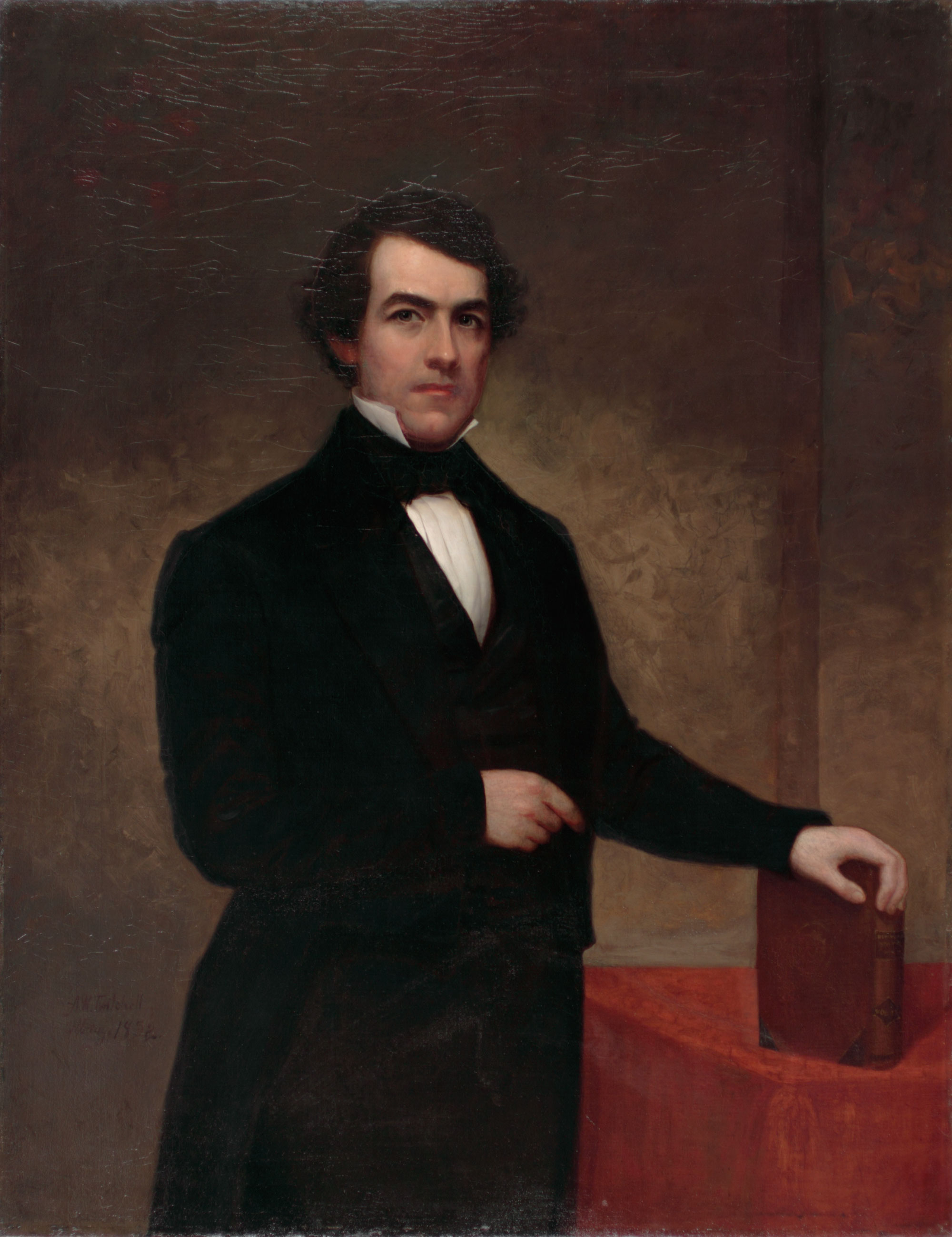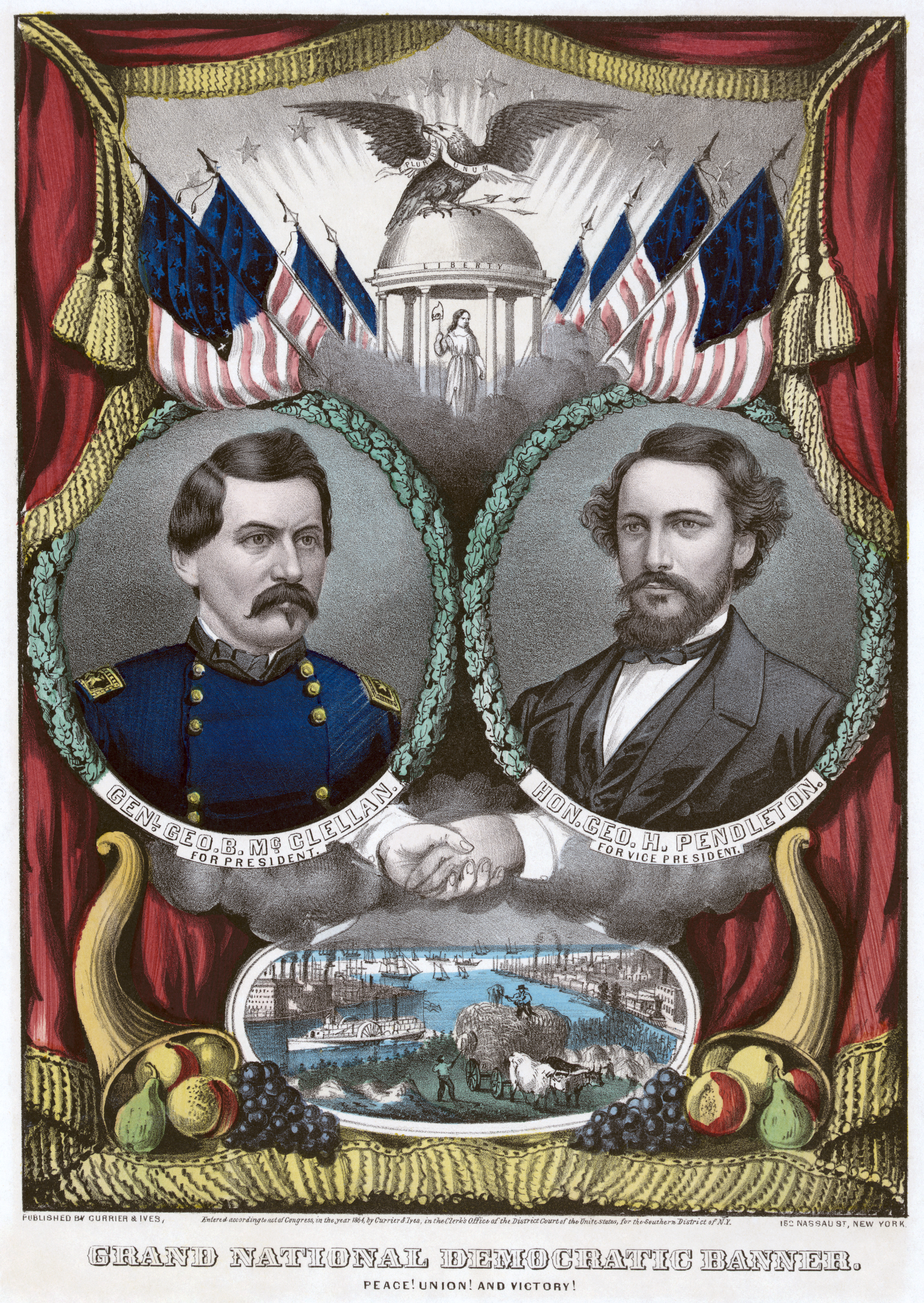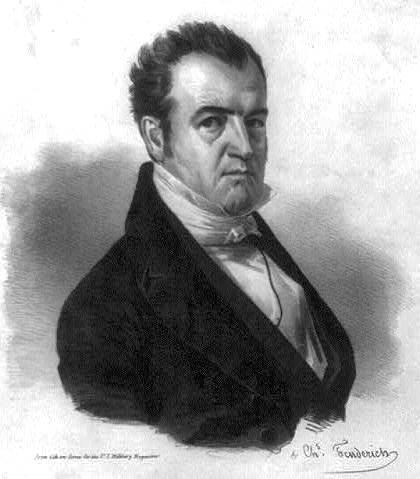|
Washington Hunt
Washington Hunt (August 5, 1811 – February 2, 1867) was an American lawyer and politician. Life and career Hunt was born in Windham, New York. He moved to Lockport, New York in 1828 to study law, was admitted to the bar in 1834, and opened a law office on Market Street in 1835. He was First Judge of the Niagara County Court from 1836 to 1841. He was elected as a Whig to the 28th, 29th and 30th United States Congresses, and served from March 4, 1843, to March 3, 1849. He was elected New York State Comptroller by the State Legislature after the resignation of Millard Fillmore who had been elected U.S. Vice President. In November 1849, he was re-elected, but resigned the comptrollership after his election as Governor of New York the following year. He was Governor from 1851 to 1852, and was defeated for re-election by Horatio Seymour. After the break-up of the Whig Party, Hunt, despite his previous association with the Seward/Weed faction of the party, was among the mo ... [...More Info...] [...Related Items...] OR: [Wikipedia] [Google] [Baidu] |
Sanford E
Sanford may refer to: People *Sanford (given name), including a list of people with the name *Sanford (surname), including a list of people with the name Places United States * Sanford, Alabama, a town in Covington County * Sanford, Colorado, a statutory town in Conejos County * Sanford, Florida, the county seat of Seminole County ** Orlando Sanford International Airport, in Sanford, Floria * Sanford, Georgia, an unincorporated community * Sanford, Kansas, an unincorporated community in Pawnee County * Sanford, Maine, a city in York County ** Sanford (CDP), Maine, a former census-designated place in downtown Sanford * Sanford, Michigan, a village in Midland County * Sanford, Mississippi, an unincorporated community in Covington County * Sanford, New York, a town in Broome County * Sanford, North Carolina, a city in Lee County * Sanford, Texas, a town in Hutchinson County * Sanford, Virginia, a census-designated place in Accomack County * Mount Sanford (Alaska), a shield volcan ... [...More Info...] [...Related Items...] OR: [Wikipedia] [Google] [Baidu] |
29th United States Congress
The 29th United States Congress was a meeting of the legislative branch of the United States federal government, consisting of the United States Senate and the United States House of Representatives. It met in Washington, D.C. from March 4, 1845, to March 4, 1847, during the first two years of James Polk's presidency. The apportionment of seats in the House of Representatives was based on the Sixth Census of the United States in 1840. Both chambers had a Democratic majority. Major events * March 4, 1845: James K. Polk became President of the United States * October 10, 1845: The Naval School (later renamed the United States Naval Academy) opened in Annapolis, Maryland * December 2, 1845: President Polk announced to Congress that the Monroe Doctrine should be strictly enforced and that the United States should aggressively expand into the West. * April 25, 1846: Open conflict over border disputes of Texas's boundaries began the Mexican–American War Major legislation * May 1 ... [...More Info...] [...Related Items...] OR: [Wikipedia] [Google] [Baidu] |
National Union Convention
The National Union Convention (also known as the Loyalist Convention, the Southern Loyalist Convention, the National Loyalists' Loyal Union Convention, or the Arm-In-Arm Convention) was held on August 14, 15, and 16 1866, in Philadelphia, Pennsylvania. Convention The convention was called in Philadelphia before of the midyear elections of 1866 in an attempt to encourage political support for US President Andrew Johnson, who was under attack by both moderate and Radical Republicans. Johnson's friends tried to rally support for his lenient pro-South Reconstruction policies. Some hoped to create a new political party, but that goal was not realized. Delegates gathered at a hastily-built temporary structure that was designed to accommodate the several thousand people expected to attend. Formally called "the Wigwam," the immense edifice was on Girard Avenue, between 19th and 20th Streets, across from Philadelphia's Girard College. About 7000 prominent politicians and activists attende ... [...More Info...] [...Related Items...] OR: [Wikipedia] [Google] [Baidu] |
Andrew Johnson
Andrew Johnson (December 29, 1808July 31, 1875) was the 17th president of the United States, serving from 1865 to 1869. He assumed the presidency as he was vice president at the time of the assassination of Abraham Lincoln. Johnson was a Democrat who ran with Lincoln on the National Union ticket, coming to office as the Civil War concluded. He favored quick restoration of the seceded states to the Union without protection for the newly freed people who were formerly enslaved. This led to conflict with the Republican-dominated Congress, culminating in his impeachment by the House of Representatives in 1868. He was acquitted in the Senate by one vote. Johnson was born into poverty and never attended school. He was apprenticed as a tailor and worked in several frontier towns before settling in Greeneville, Tennessee. He served as alderman and mayor there before being elected to the Tennessee House of Representatives in 1835. After briefly serving in the Tennessee Senate, J ... [...More Info...] [...Related Items...] OR: [Wikipedia] [Google] [Baidu] |
Jacob Thompson
Jacob Thompson (May 15, 1810 – March 24, 1885) was the United States Secretary of the Interior, who resigned on the outbreak of the American Civil War and became the Inspector General of the Confederate States Army. In 1864, Jefferson Davis asked Thompson to lead a delegation to Canada, where he appears to have been leader of the Confederate Secret Service. From here, he is known to have organised many anti-Union plots and was suspected of many more, including a possible meeting with Lincoln's assassin, John Wilkes Booth. Union troops burned down his mansion in Oxford, Mississippi, the hometown of William Faulkner, who based some of his fictional characters on Thompson. Early life Born in Leasburg, North Carolina in 1810 to Nicolas Thompson and Lucretia (van Hook) Thompson, Thompson attended Bingham Academy in Orange County, North Carolina and later went on to graduate from the University of North Carolina in 1831, where he was a member of the Philanthropic Society. Afterwa ... [...More Info...] [...Related Items...] OR: [Wikipedia] [Google] [Baidu] |
1864 Democratic National Convention
The 1864 Democratic National Convention was held at The Amphitheatre in Chicago, Illinois. The Convention nominated Major General George B. McClellan from New Jersey for president, and Representative George H. Pendleton of Ohio for vice president. McClellan, age 37 at the time of the convention, and Pendleton, age 39, are the youngest major party presidential ticket ever nominated in the United States. Background The Democratic Party was bitterly split over the American Civil War between the War Democrats and the Peace Democrats. Also making matters complicated were the factions that existed among the Peace Democrats. For much of the war they had been dominated by the Copperheads, led by Clement Vallandigham. The Copperheads declared the war to be a failure and favored an immediate end to hostilities without securing Union victory, either via re-admitting all the Confederate states with slavery intact and legally protected, or by formally recognizing the Confederacy as a sover ... [...More Info...] [...Related Items...] OR: [Wikipedia] [Google] [Baidu] |
George McClellan
George Brinton McClellan (December 3, 1826 – October 29, 1885) was an American soldier, Civil War Union general, civil engineer, railroad executive, and politician who served as the 24th governor of New Jersey. A graduate of West Point, McClellan served with distinction during the Mexican–American War and later left the Army to serve as an executive and engineer on railroads until the outbreak of the American Civil War Early in the conflict, McClellan was appointed to the rank of major general and played an important role in raising a well-trained and disciplined army, which would become the Army of the Potomac in the Eastern Theater; he served a brief period (November 1861 to March 1862) as Commanding General of the United States Army of the Union Army. McClellan organized and led the Union army in the Peninsula Campaign in southeastern Virginia from March through July 1862. It was the first large-scale offensive in the Eastern Theater. Making an amphibious clockwise t ... [...More Info...] [...Related Items...] OR: [Wikipedia] [Google] [Baidu] |
Stephen Douglas
Stephen Arnold Douglas (April 23, 1813 – June 3, 1861) was an American politician and lawyer from Illinois. A senator, he was one of two nominees of the badly split Democratic Party for president in the 1860 presidential election, which was won by Republican Abraham Lincoln. Douglas had previously defeated Lincoln in the 1858 United States Senate election in Illinois, known for the pivotal Lincoln–Douglas debates. He was one of the brokers of the Compromise of 1850 which sought to avert a sectional crisis; to further deal with the volatile issue of extending slavery into the territories, Douglas became the foremost advocate of popular sovereignty, which held that each territory should be allowed to determine whether to permit slavery within its borders. This attempt to address the issue was rejected by both pro-slavery and anti-slavery advocates. Douglas was nicknamed the "Little Giant" because he was short in physical stature but a forceful and dominant figure in politic ... [...More Info...] [...Related Items...] OR: [Wikipedia] [Google] [Baidu] |
John Bell (Tennessee Politician)
John Bell (February 18, 1796September 10, 1869) was an American politician, attorney, and planter who was a candidate for President of the United States in the election of 1860. One of Tennessee's most prominent antebellum politicians,Jonathan Atkins,John Bell" ''Tennessee Encyclopedia of History and Culture'', 2009. Retrieved: October 10, 2012. Bell served in the House of Representatives from 1827 to 1841, and in the Senate from 1847 to 1859. He was Speaker of the House for the 23rd Congress (1834–1835), and briefly served as Secretary of War during the administration of William Henry Harrison (1841). In 1860, he ran for president as the candidate of the Constitutional Union Party, a third party which took a neutral stance on the issue of slavery. and won the electoral votes of three states. Initially an ally of Andrew Jackson, Bell turned against Jackson in the mid-1830s and aligned himself with the National Republican Party and then the Whig Party, a shift that ea ... [...More Info...] [...Related Items...] OR: [Wikipedia] [Google] [Baidu] |
Constitutional Union Party (United States)
The Constitutional Union Party was a United States third party active during the 1860 elections. It consisted of conservative former Whigs, largely from the Southern United States, who wanted to avoid secession over the slavery issue and refused to join either the Republican Party or the Democratic Party. The Constitutional Union Party campaigned on a simple platform "to recognize no political principle other than the Constitution of the country, the Union of the states, and the Enforcement of the Laws". The Whig Party had collapsed in the 1850s due to a series of sectional crises over slavery. Though some former Whigs joined the Democratic Party or the new, anti-slavery Republican Party, others joined the nativist American Party. The American Party entered a period of rapid decline following the 1856 elections, and in the lead-up to the 1860 elections John J. Crittenden and other former Whigs founded the Constitutional Union Party. The 1860 Constitutional Union Convention ... [...More Info...] [...Related Items...] OR: [Wikipedia] [Google] [Baidu] |
1856 Whig National Convention
The 1856 Whig National Convention was a presidential nominating convention held from September 17 to September 18, in Baltimore, Maryland. Attended by a rump group of Whigs who had not yet left the declining party, the 1856 convention was the last presidential nominating convention held by the Whig Party. The convention nominated a ticket consisting of former President Millard Fillmore and former Ambassador Andrew J. Donelson; both had previously been nominated by the 1856 American National Convention. The Whig ticket finished third in the 1856 presidential election behind the winning Democratic ticket of James Buchanan and John C. Breckinridge, the runner-up Republican ticket of John C. Fremont and William L. Dayton. Fall of the Whigs The Whig party had been declining in power for some time before its last national convention in 1856. In the 1850 midterm elections, Democrats strengthened their majority as the Whigs lost 23 seats in the House and 2 seats in the Senate. In 185 ... [...More Info...] [...Related Items...] OR: [Wikipedia] [Google] [Baidu] |
Thurlow Weed
Edward Thurlow Weed (November 15, 1797 – November 22, 1882) was a printer, New York newspaper publisher, and Whig and Republican politician. He was the principal political advisor to prominent New York politician William H. Seward and was instrumental in the presidential nominations of William Henry Harrison (1840), Zachary Taylor (1848), and John C. Frémont (1856). Born in Cairo, New York, Weed apprenticed as a printer under William Williams and served with him in the War of 1812 before winning election to the New York State Assembly. He met Seward in the assembly, and they formed a close political alliance that lasted for several decades. Weed and Seward became leaders of the New York Anti-Masonic Party, and Weed established the ''Albany Evening Journal'' as the party's main newspaper. Weed supported the American System of Henry Clay and helped establish the Whig Party in the 1830s. He helped Seward win election as Governor of New York and supported the successful presi ... [...More Info...] [...Related Items...] OR: [Wikipedia] [Google] [Baidu] |









